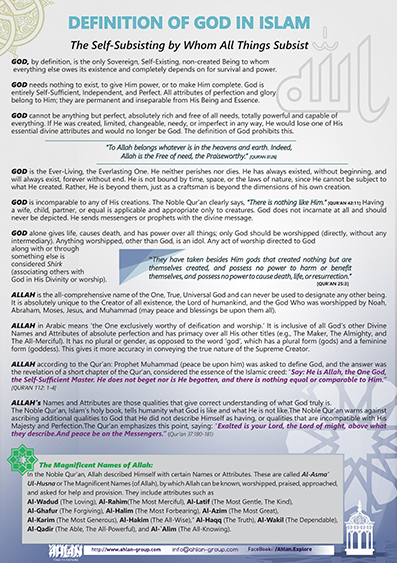It’s a question that has echoed through history, sparked countless discussions, and continues to intrigue anyone interested in religion: Do Judaism, Christianity, and Islam worship the same God?
In this article, we journey through the shared roots, the striking similarities, and the deep differences that have shaped how each faith views God. We also explore how and why disagreements emerged over time, offering a clear, thoughtful look into one of the most fascinating questions about these religions.
Do Christianity, Judaism And Islam Believe In The Same God?
The common belief is that all Judaism, Christianity, and Islam—worship the same one God, the source of all divine revelations, including the Torah, Gospel, and Quran.
Almighty God instructs the believers in the Quran to remind the jews and Christians of the common beliefs calling them gently to the final revelation:
“And say, “We believe in what has been revealed to us and what was revealed to you. Our God and your God is ˹only˺ One. And to Him we ˹fully˺ submit.”
While this shared foundation exists, the current interpretations of God in Judaism and Christianity have changed differently over time.
According to Islamic belief, distortions and additions have altered the original scriptures of Judaism and Christianity. Islam, as the final and preserved revelation, affirms the original essence of pure monotheism and corrects misconceptions introduced over time.
Let’s explore the similarities and differences in the concept of God as understood in Judaism, Christianity, and Islam.
Do Judaism, Christianity And Islam Believe In One God?
They share a foundational belief in the oneness of God. According to various sources, this concept of a Unipersonal God is clearly emphasized in divine revelations—the Torah, the Gospel, and the Quran.
The Torah’s Emphasis on One God
Judaism firmly upholds strict monotheism. The Old Testament—particularly the Torah, central to Jewish belief—repeatedly emphasizes God’s oneness. One powerful verse is found in:
“I, even I, am the Lord, and besides Me there is no Savior.” Book of
This and other passages affirm that God is a singular, unipersonal being, without intermediaries or divine partners.
Original Teachings of Jesus Support Monotheism
Although modern Christianity often centers on the doctrine of the Trinity, historical and scriptural analysis indicates that Jesus’s earliest teachings reflected strict monotheism. For example:
“The first of all the commandments is: ‘Hear, O Israel, the Lord our God is one Lord.’”
Jesus never explicitly called for worship of himself. Instead, he:
- Prayed to God (Matthew 26:39)
- Was viewed as a prophet (Mark 6:15, Luke 7:16)
Change of the Christian Concept of God over Time
Scholarly christian sources admit the impossibility of restoring the original message of the Bible. The oldest available manuscripts are in Greek, not Aramaic, the language Jesus spoke. These texts were written by non-eyewitnesses, and over time, translational errors and doctrinal insertions altered the original monotheistic message.
Read more:
God’s Oneness in Islam
Islam teaches the purest and most uncompromised form of monotheism, declaring that Allah (the Arabic name for God) is One, Unique, and Unrivaled:
“Say: He is Allah, the One and Only.”
The Quran further emphasizes that God has no partners, children, or equals, reinforcing the same message found in earlier revelations, but preserved in its final form.
To sum up, the belief in one, unipersonal God was the original core message shared by the divine scriptures, including the Torah (central to Judaism), the Gospel (original teachings of Christianity), and the Quran (Islam). However, deviations that occurred within the biblical texts over time, particularly concerning the concept of God, lead to differing understandings in the modern forms of these faiths.
Read more:
God’s Name: Hashem, Yahweh, or Allah?
Jews, christians and muslims use diiferent names to refer to almighty god. Are these names referring to the same divine being? Why do these differences exist? Let’s explore the significance of God’s name in each religion.
God’s Name in Judaism
In Judaism, God’s name is considered so sacred that it is not pronounced aloud. Over thousands of years of non-verbal usage, the original pronunciation has been lost, and only the written form remains.
- The written name of God consists of four Hebrew consonants: YHWH, also known as the Tetragrammaton.
- This has been Latinized and developed into the English rendering Jehovah, which serves more as a title meaning “The Lord” or “The God,” rather than a proper name.
- Instead of using God’s name directly, Jews commonly say “Hashem,” which literally means “The Name,” as a respectful way to refer to God.
- In written English, some Jews write “G‑d” to avoid using the full form of the word “God” out of reverence.
God’s Name in Christianity
Christians also use the term “Yahweh”, sharing it with Judaism, but the usage differs:
Unlike Jewish tradition, Christians generally have no restrictions against pronouncing the name.
Thus, Yahweh is not considered a proper name but a title, translated in English as “The Lord” or “God,” and in Arabic as “Ar-Rabb.”
God’s Name in Islam
In Islam, the name “Allah” is considered the proper name of the One True God, the Creator of the heavens and the earth:
- The name Allah is unique and not derived from any root that can be pluralized or gendered.
- Its use predates Islam and was used by Arab Jews and Christians in their religious texts.
- Even today, the word “Allah” appears in Arabic translations of the Bible to refer to God.
- Islam teaches that Allah is One, Unique, and Eternal, without partners, children, or equals.
Finally, if Yahweh is understood to be the Creator of the heavens and the earth, the one, unique, and perfect deity with no partners or family, then both “Allah” and “Yahweh” refer to the same God.
Read also:The Name Allah – Meaning, Root, Significance and More!
How is God depicted in Judaism, Christianity and Islam?
Judaism, Christianity, and Islam are monotheistic religions that believe in one Almighty God. While they share core attributes of God—such as His power, mercy, and justice—the practical understanding and relationship with God differ among them. Below is a comparison of how each religion views God’s nature and interaction with humanity.
Is God Just and Loving?
Judaism and Islam emphasize both the justice and mercy of God, with a strong focus on human accountability:
- In Judaism, each individual is responsible for their actions, and divine justice ensures that good and evil are ultimately rewarded or punished. Still, the concept of justice comes into question, as Judaism emphasizes national revelation and considers Jews the ‘chosen people,’ often leading to an elevated status over others. In the Mishneh Torah, while commenting on the permissibility of deceiving non-Jews, Maimonides states: ‘Those who lack human qualities are not truly human.'”
- Christianity—particularly in its altered doctrines—introduces the concept of unconditional divine love through the crucifixion of Jesus. This understanding places less emphasis on personal accountability and more on faith in salvation through Jesus—a stance that raises significant questions about the concept of justice.
- In Islam, however, God is portrayed as Just and Loving, but love from God is conditional upon the choice of following the path of islam the final divine message to humanity. The Quran states:
“Say, ˹O Prophet,˺ ‘If you ˹sincerely˺ love Allah, then follow me; Allah will love you and forgive your sins. For Allah is All-Forgiving, Most Merciful.’”
(Quran 3:31)
Moreover, the Quran emphasizes individual accountability (translated): “No soul burdened with sin will bear the burden of another.” (Quran, 53:38)
Read also:
- Does Almighty God Love Us?
- God’s Mercy in Islam and Christianity
- Does God Forgive All Sins?
- What is Islam?
Can God Be Visually Portrayed?
Both Judaism and Islam firmly reject the idea of visually depicting God. They hold that:
- The Divine Essence is beyond human imagination.
- Any attempt to portray God would limit His transcendence and misrepresent His reality.
In addition, Islam offers a deep understanding of God through His Names and Attributes, which describe His mercy, knowledge, power, and more. These names help believers love and worship God with better comprehension.
In contrast, Christianity has historically accepted visual representations undermining the holiness of divinity.
Is Direct Connection to God Possible?
- Islam encourages a direct and personal relationship with God, without the need for clergy or intermediaries. Muslims pray directly to God (Allah), ask for guidance, and confess their sins.
- In Judaism and Christianity, formal intercession by religious leaders is often necessary in many traditional practices.
Finally, while there are shared beliefs rooted in the original divine source of Judaism, Christianity, and Islam, significant differences make it a matter of one ultimate truth to follow.
Read more:
Conclusion
This article explored the main differences between Judaism, Christianity, and Islam in how they view God.
If there really is a Creator, wouldn’t He make sure His true message is preserved — for anyone still searching for Him?
The Qur’an is that preserved message. It’s not just a book — it’s God’s words, unchanged, calling you to know Him, love Him, and follow the path He chose for you.
If your heart is still searching for truth, then know that Islam is the way to your Creator.
He is inviting you — will you answer His call?
Don’t let the journey end here. Open the Qur’an today and discover the full story of the Almighty God — directly from His words. And remember, you’re not alone. Our team is here to support you every step of the way!














